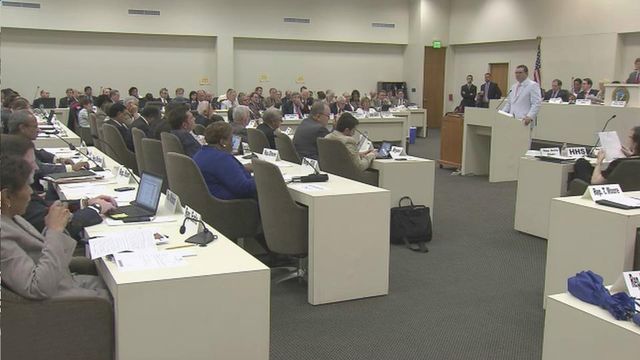N.C. House set to vote on tax reforms
House Bill 998, sponsored by Rep. David Lewis, R-Harnett, would lower personal and corporate income taxes, but would expand sales taxes to labor charges, delivery and installation, electric bills and movie tickets. It was approved Thursday afternoon by the House Appropriations committee.
Posted — Updated"Under this plan, the working families of North Carolina will see more dollars in their pocket, and our state will become more competitive," Lewis told the committee.
The proposal would cut the state's income tax rates from a three-bracket system of 6 percent, 6.75 percent and 7.75 percent to a flat tax rate of 5.9 percent starting in 2014. The standard deduction would be doubled.
Corporate taxes would be cut from 6.9 percent currently in annual increments to 5.4 percent by 2018. Franchise taxes would also be cut.
The original bill would have capped deductions for mortgage interest, property tax and charitable contributions to no more than $25,000 total for a married couple filing jointly.
After some members of the Republican caucus rebelled, the proposal was amended to allow unlimited deductions for charitable contributions, while keeping the cap on mortgage interest and local property tax deductions at $25,000.
"Based on the research we've done, that accounts for over 97 percent of folks in the state who pay these bills," Lewis said.
Lewis said removing the cap on charitable deductions increased the cost of the package from $1.2 billion over five years to $1.7 billion.
Republicans are touting this as a massive tax cut that will stimulate the state's economy and make it more competitive with neighboring states. But Democrats say it's too much money to take out of the state's already pared-down budget.
"You're making the assumption that all of our programs are perfect as-is and we just need to maintain them." said Rep. Verla Insko, D-Orange. "We are cutting our essential services."
Critics of the bill say it simply shifts the state tax burden from the wealthy to the lower and middle class, who would pay more in sales taxes.
While the proposal cuts the sales tax rate slightly from 6.75 percent to 6.65 percent (with local governments, not the state, taking the loss in revenue), it would extend the sales tax to service contracts, tailoring and dry cleaning, movie and concert tickets, labor for repairs and maintenance, cleaning charges and delivery and installation of goods.
It would also increase the tax rate on electricity, repealing the 3.22 percent franchise tax and raising the sales tax from 3 percent to 6.65 percent instead.
The House version would not change the current 2 percent sales tax on groceries, and would not add sales tax to prescription drugs.
It also cuts only two of the state's hundreds of tax loopholes: the Energy Star tax holiday and an exemption for nutritional supplements sold by chiropractors.
Copyright 2024 by Capitol Broadcasting Company. All rights reserved. This material may not be published, broadcast, rewritten or redistributed.






